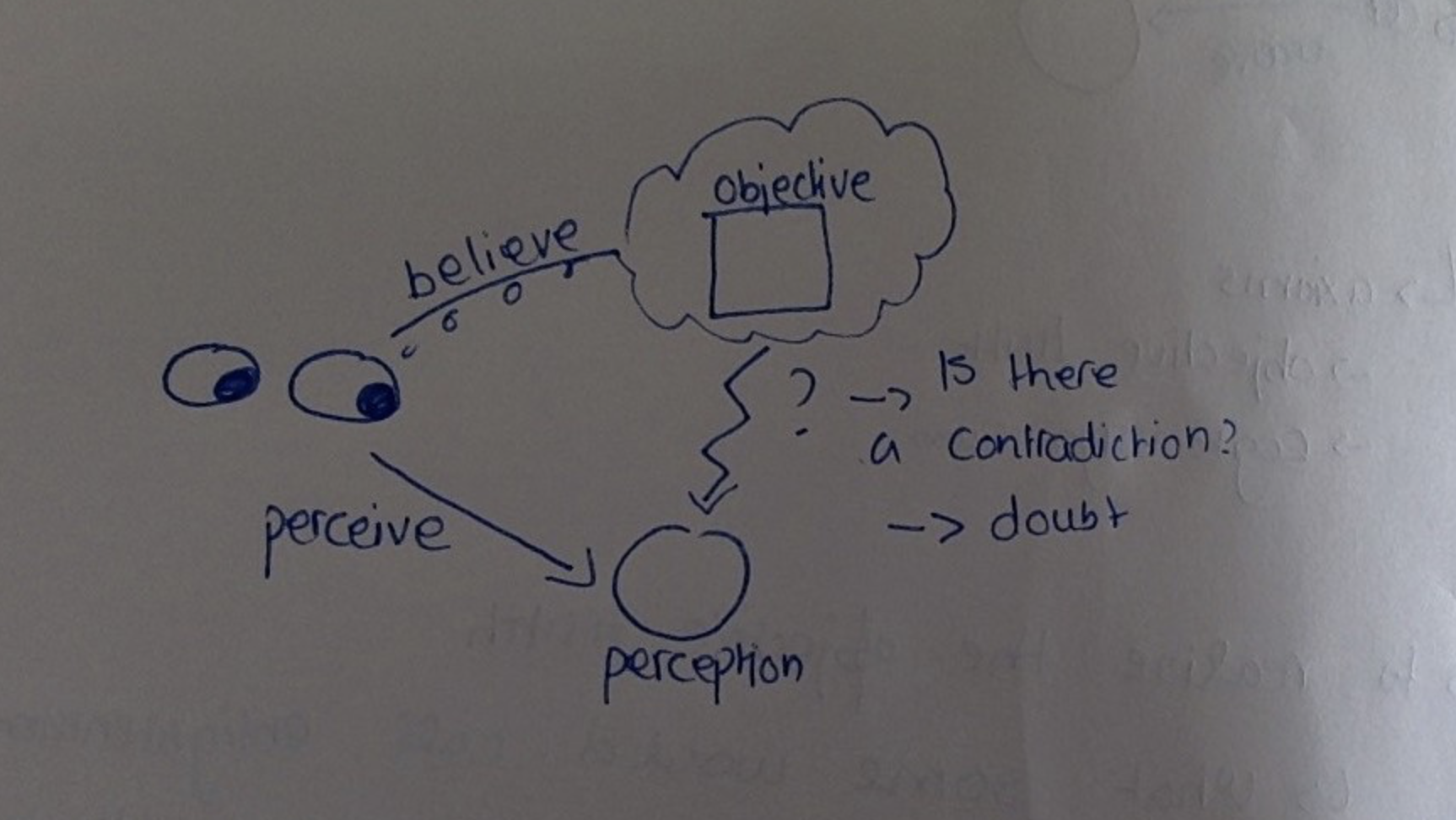“If you tried to doubt everything you would not get as far as doubting anything. The game of doubting itself presupposes certainty.” - Ludwig Wittgenstein
What is it to doubt? To doubt is to call into question, to not trust that something is the way it seems to be, be it the way we perceive it to be or the way we have been told to perceive it to be. What is it we are doubting then? Our senses, or our surroundings?
In the end, the question isn’t even very pertinent, for our surroundings are nothing but a result of our senses. Without them, we would not be able to perceive our surroundings, and if we can’t do that, surroundings only exist in a objective way, completely independent of us, meaning if we shut off our senses, the world will continue to exist, but our world will not, for there is nothing more to input to it. And anything we would doubt would be something we perceive, therefore our surroundings and therefore our senses. So we can simplify and say we are, first of all, doubting our senses. This means we do not trust our input. But what does trust mean? To trust is to rely on the truthfulness and accuracy of something (Source: Dictionary defintion) to believe that something matches the truth. What truth? If it is our senses we do not trust, then it would be circular to try to match with any subjective truth. Therefore, we are matching what we perceive with an objective truth. We doubt what we perceive by matching it with its absolutely true counterpart, and if there is a discrepancy, we judge our perception as false. (see: Fig 1. The process of doubting something)

But if we doubt everything, absolutely everything, we would doubt this objective truth too! But that would result in a contradiction, for we cannot doubt something that 1. We cannot even perceive (Objective truth is a theoretical concept, which we cannot perceive for perceiving it would destroy its objectivity) and 2. Is the basis on which we doubt something. If we were to do that, there is nothing we match our doubts to, either to dispel the doubt or to justify it, and therefore, it stops being a doubt at all, and remains nothing but a perception.
Another such contradiction arises when you question your existence. “I think while not existing, therefore my thoughts do not exist, therefore I do not think.” This sentence contradicts itself instantly. We are therefore forced to believe that because we think, we exist, or the famous saying by Descartes, “Cogito Ergo Sum”. Therefore, to be able to doubt, it is necessary to believe in an absolute truth and in ones existence. This means that, perhaps paradoxically, it’s impossible to doubt everything without believing in some things. These logically undoubtable (for if we were to doubt them doubt itself as a concept would collapse) things are what I would call axioms.
But assuming we do believe in these axioms, where does doubting everything get us?
As established before, when we doubt, we are in fact doubting our perception. And we have good reason to do so: often, our senses can be proven wrong. Optical illusions, hallucinations, why even dreams, the list of these deceptions goes on. However, if we doubt everything, that we have even the slightest inkling could be false, then by doubting it what we are actually doing is checking for its truth. This theoretical objective truth is believed to be indisputable, or certain. By doubting and matching observation with truth, we filter perception into true and false, creating a world view we are certain about. Therefore, step by step, doubting everything leads to certainty, or as the titular quote states: “The game of doubting itself presupposes certainty.” - to be certain of anything, one has to doubt it first. Doubt becomes a tool in the examination of the truth. Doubt leads to certainty. If you cannot doubt something, you cannot be certain of it.
Through this conclusion, an interesting contradiction arises: to doubt anything, you need to doubt it against something you are certain about (something indisputable), but yet only by doubting everything do you reach a sense of certainty. If you base certainty on something technically uncertain (since you cannot doubt it) such as an axiom, how is it certain? How to resolve this contradiction?
This is where the human side of philosophy arises. To be grounded in anything, even doubt, nothing other than blind belief can resolve such a contradiction. Some may say that this objective truth can be attained, by cutting off all senses and focusing solely on the spiritual. Once this objective truth (for now this truth has been perceived without any senses) is realized, they say the person is enlightened. Since this enlightened person now knows the objective truth, doubt becomes superfluous.
Others may say that this objective truth manifests itself as God, and this God must simply be believed in. Doubting God is simply out of the question, because without this one belief, your entire understanding will crumble since the concept of doubt (and therefore certainty) becomes impossible.
The certainty of anything and everything else can be derived from this one blind belief, through the process of doubt.
To conclude, I agree with Wittgenstein's quote: doubting everything (including an objective truth) will lead to the concept of doubt breaking down. However, doubting with the idea of this truth leads to the discovery of certainty. This would however require that the idea of an objective truth be blindly and utterly believed in, be it under the idea of God or Enlightenment.
